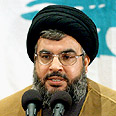
Nasrallah: Anxious over outcome
צילום: אי פי איי
IDF: Over 200 Hizbullah casualties
Payback: Jihad Attiya, logistical coordinator for Hizbullah's southern branch, who planned kidnapping of 3 Israeli soldiers six years ago, killed in IAF targeted strike. IDF holds names of at least 200 Hizbullah terrorists, including senior members, killed since beginning of conflict
Army officials have begun revealing the names of Hizbullah operatives killed since the beginning of the recent conflict. The most interesting Hizbullah casualty is Jihad Attiya, the logistical coordinator of Hizbullah’s southern branch and among the chief organizers of the October 2000 kidnapping of three IDF soldiers – Adi Avitan, Benyamin Avraham and Omar Souad. Attiya was killed in a targeted air strike.
In the hands of the IDF are the names of at least 200 Hizbullah operatives killed since the outbreak of fighting in the north, including a number of senior Hizbullah members, such as Nur Shalhoub, who was responsible for transporting arms from Syria to Lebanon. Additionally, the terror group’s central sector operations officer was killed last week during an IDF ground offensive in south Lebanon.
Iran’s role
Despite the heavy blow dealt to Hizbullah, IDF officials assessed that the group’s leadership system was still functioning and Hizbullah forces in the field were continuing to take directives from the upper ranks of command.
As well, Iran continued to aid Hizbullah through its presence in Lebanon, a presence which includes forces of the Revolutionary Guard Corps. Army sources believed the Iranians were involved in the missile attack on the Israeli navy gunship at the start of the fighting, which killed four Israeli soldiers, as the more sophisticated missile may have proved difficult for Hizbullah operatives to operate without guidance.
It is in Tehran’s interest that Hizbullah keep hold on its military and political power in Lebanon, as they hope to make use of it in the future when the issue of Iran’s nuclear armament comes to the fore and Iran will need a militia on hand that can pose a significant threat to Israel.
The outcome
Israel is assiduously tracking public addresses by Hizbullah chief Hassan Nasrallah, and its central assessment is that the group hopes for a ceasefire as soon as possible, and will do anything to achieve such a position.
Nasrallah is apparently anxious over an expansion of IDF ground operations as well as over intra-Lebanese legitimization of the fighting and criticism of his group.
The question of ‘How will the conflict end?’ depends on the type of force that deploys to south Lebanon. If it is a force like UNIFIL, which lacks both authority and might, Nasrallah will view this as a positive achievement. On the other hand, the deployment of a multinational force with true policing and enforcement powers could constitute a defeat for Nasrallah.
In any case, with the fashioning of a new reality on the Israeli-Lebanese border, cleared of any traces of Hizbullah, it would be difficult for the group to carry out another kidnapping or sniper attack. With that, Hizbullah would still be capable of firing rockets at Israeli territory.
Contrary to the high number of casualties reported in the Lebanese village of Qana Sunday as a result of an IAF strike (up to 50), the Lebanese government and the Red Cross hold differing figures which show that 27 people were killed.










